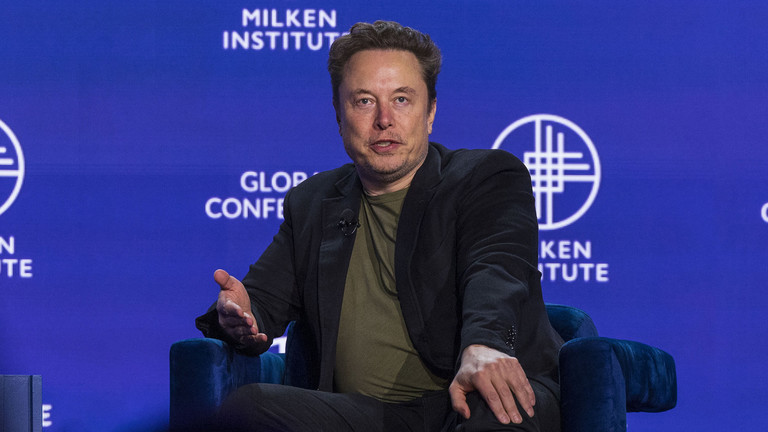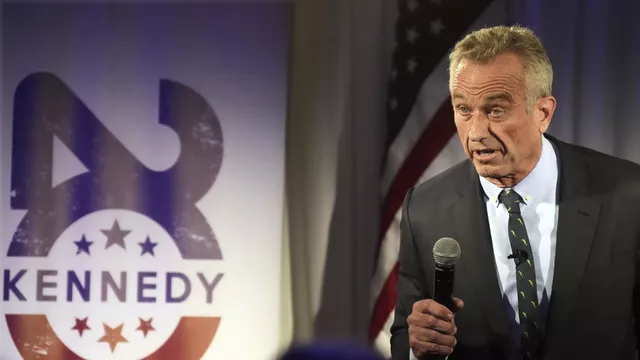©Yolanda Ruiz/Keystone Press Agency/Global Look Press
US tech mogul Elon Musk has asked French President Emmanuel Macron to shed light on the reasons behind the arrest of Telegram founder and CEO Pavel Durov. The Russian entrepreneur was detained last week upon arriving at Paris-Le Bourget Airport.
The French judicial authorities have twice extended Durov’s detention. The Paris Public Prosecutor’s Office has stated that he was arrested as part of a broad criminal inquiry against an unnamed person.
“It would be helpful to the global public to understand more details about why he was arrested,” Musk wrote in a comment under Macron’s post on X (formerly Twitter).
It would be helpful to the global public to understand more details about why he was arrested
— Elon Musk (@elonmusk) August 27, 2024
On Sunday, the French leader took to X to deny having any political motive for detaining Durov. He insisted that the arrest is part of “an ongoing judicial investigation” in which the courts will decide the entrepreneur’s fate.
Durov has said he has faced pressure from the US. In an interview with American journalist Tucker Carlson in April, he claimed that he received “too much attention” from the FBI and other law enforcement agencies while on US soil.
According to the prosecutors, Durov could face charges ranging from complicity in drug dealing and money laundering, to facilitating the distribution of child pornography.
French media had previously reported that the arrest of the 39-year-old Russian citizen, who also holds French, UAE, and St. Kitts and Nevis citizenship, was related to alleged offenses regarding Telegram. Reports suggest that the authorities believe Durov is complicit in a range of crimes allegedly committed via the social media app due to insufficient moderation.
Born in Leningrad (now St. Petersburg) in 1984, Durov left Russia in the mid-2010s and has since mainly lived in the UAE. In 2021, he was granted French citizenship. In July, Durov wrote on his Telegram channel that the number of active monthly users of the messaging platform had grown to 950 million.
Durov’s arrest has been denounced as an infringement upon rights enjoyed in both the EU and the US. Carlson, Serbian President Aleksandar Vucic, former CIA and NSA contractor Edward Snowden, and Silicon Valley investor David Sacks have spoken out in support of the entrepreneur. Shortly after the arrest, Musk, who launched the hashtag #FreePavel, suggested that the pressure on freedom of speech could worsen.
RFK Jr. in Light of Durov Arrest Says Europe Has Lost Free Speech Rights
Independent presidential candidate Robert F. Kennedy Jr., in response to France arresting Telegram messenger's CEO Pavel Durov, said that free speech rights in Europe are gone.
"We've lost Europe. Europe now does not have free speech," Kennedy said during a podcast interview with US journalist Tucker Carlson that aired on Monday.
Kennedy also pointed out that US billionaire entrepreneur Elon Musk has been made out to be seen as a "villain" after purchasing Twitter and making it a free speech platform. Musk would have been the hero of the old Democratic party in the United States, Kennedy added.
Earlier, Durov's detention in France was extended until Wednesday.
Durov was detained at the Paris Le Bourget airport on August 24. According to a statement from the Paris prosecutor's office, he is suspected of involvement in a number of offenses, including failure to provide the requested information to the authorities, and management of a messenger that is allegedly used to distribute child pornography and to trade drugs.
According to the French press, Durov, who also has French citizenship, was on the country's wanted list; the businessman could face up to 20 years in prison.
Durov won’t give secrets to West – Russian spy chief
The West is highly unlikely to get any sensitive data on Russia from Telegram CEO Pavel Durov, who was arrested by the French authorities last week, according to Sergey Naryshkin, the head of the Foreign Intelligence Service (SVR).
Asked in an interview with TASS on Tuesday whether Moscow was concerned about Durov handing over any secrets to the West, the Russian spy chief rejected the notion. “I really hope that he will not allow this,” Naryshkin said.
The Telegram CEO was arrested at a Paris airport after arriving by private plane from Azerbaijan on Saturday. According to French prosecutors, Durov, who is a citizen of France, Russia, the UAE, and St. Kitts and Nevis, was taken into custody as part of a broader probe investigating child pornography, drug sales, fraud, and other criminal activities on the platform. Durov is also being investigated for allegedly refusing to cooperate with law enforcement looking into cyber and financial crimes.
Telegram has pushed back against the potential charges, saying it is “absurd to claim that a platform or its owner are responsible for abuse of that platform.” Meanwhile, numerous opinion leaders around the world have interpreted the arrest as a crackdown on free speech, with speculation that the US was ultimately behind the detention.
Russian Foreign Minister Sergey Lavrov suggested that the arrest had been made “obviously on someone’s advice,” adding that the people behind the decision were hoping to get their hands on Telegram encryption codes. “The French actions have proven that Telegram is indeed a resilient and popular network,” he argued.
Meanwhile, Kremlin spokesman Dmitry Peskov dismissed as “utter stupidity” the idea that Telegram users would have to delete their message feeds on the platform following Durov’s arrest, adding that senior Russian government officials do not use the network for work purposes.
French President Emmanuel Macron has insisted that Durov’s arrest “is in no way a political decision,” noting that his country remains committed to the principle of free speech. However, Peskov suggested that the investigation could turn political after all.
Any charges against Durov “require… a serious evidence base,” he cautioned. “Otherwise, it will be a direct attempt to restrict the freedom of communication and, one might even say, to directly intimidate the head of a large company.”



No comments:
Post a Comment